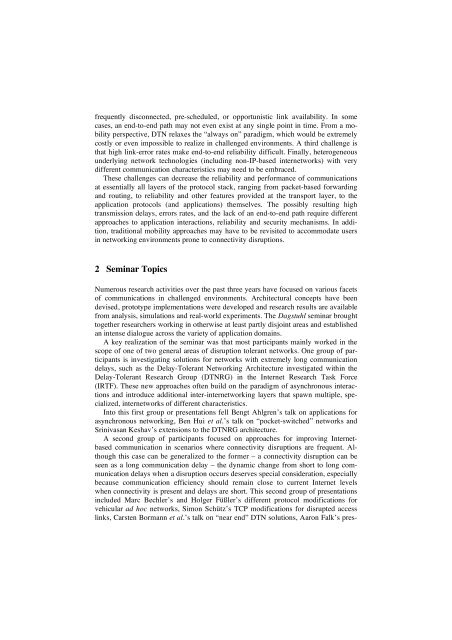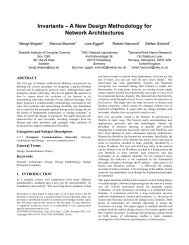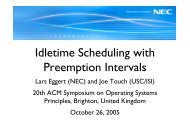Disruption Tolerant Networking - Lars Eggert
Disruption Tolerant Networking - Lars Eggert
Disruption Tolerant Networking - Lars Eggert
You also want an ePaper? Increase the reach of your titles
YUMPU automatically turns print PDFs into web optimized ePapers that Google loves.
frequently disconnected, pre-scheduled, or opportunistic link availability. In some<br />
cases, an end-to-end path may not even exist at any single point in time. From a mobility<br />
perspective, DTN relaxes the “always on” paradigm, which would be extremely<br />
costly or even impossible to realize in challenged environments. A third challenge is<br />
that high link-error rates make end-to-end reliability difficult. Finally, heterogeneous<br />
underlying network technologies (including non-IP-based internetworks) with very<br />
different communication characteristics may need to be embraced.<br />
These challenges can decrease the reliability and performance of communications<br />
at essentially all layers of the protocol stack, ranging from packet-based forwarding<br />
and routing, to reliability and other features provided at the transport layer, to the<br />
application protocols (and applications) themselves. The possibly resulting high<br />
transmission delays, errors rates, and the lack of an end-to-end path require different<br />
approaches to application interactions, reliability and security mechanisms. In addition,<br />
traditional mobility approaches may have to be revisited to accommodate users<br />
in networking environments prone to connectivity disruptions.<br />
2 Seminar Topics<br />
Numerous research activities over the past three years have focused on various facets<br />
of communications in challenged environments. Architectural concepts have been<br />
devised, prototype implementations were developed and research results are available<br />
from analysis, simulations and real-world experiments. The Dagstuhl seminar brought<br />
together researchers working in otherwise at least partly disjoint areas and established<br />
an intense dialogue across the variety of application domains.<br />
A key realization of the seminar was that most participants mainly worked in the<br />
scope of one of two general areas of disruption tolerant networks. One group of participants<br />
is investigating solutions for networks with extremely long communication<br />
delays, such as the Delay-<strong>Tolerant</strong> <strong>Networking</strong> Architecture investigated within the<br />
Delay-<strong>Tolerant</strong> Research Group (DTNRG) in the Internet Research Task Force<br />
(IRTF). These new approaches often build on the paradigm of asynchronous interactions<br />
and introduce additional inter-internetworking layers that spawn multiple, specialized,<br />
internetworks of different characteristics.<br />
Into this first group or presentations fell Bengt Ahlgren’s talk on applications for<br />
asynchronous networking, Ben Hui et al.’s talk on “pocket-switched” networks and<br />
Srinivasan Keshav’s extensions to the DTNRG architecture.<br />
A second group of participants focused on approaches for improving Internetbased<br />
communication in scenarios where connectivity disruptions are frequent. Although<br />
this case can be generalized to the former – a connectivity disruption can be<br />
seen as a long communication delay – the dynamic change from short to long communication<br />
delays when a disruption occurs deserves special consideration, especially<br />
because communication efficiency should remain close to current Internet levels<br />
when connectivity is present and delays are short. This second group of presentations<br />
included Marc Bechler’s and Holger Füßler’s different protocol modifications for<br />
vehicular ad hoc networks, Simon Schütz’s TCP modifications for disrupted access<br />
links, Carsten Bormann et al.’s talk on “near end” DTN solutions, Aaron Falk’s pres-





